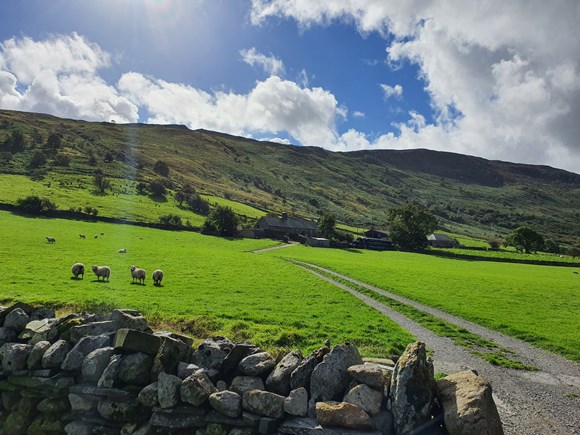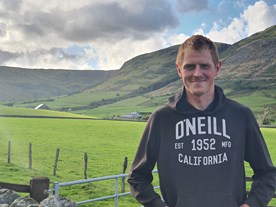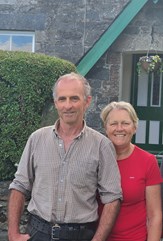Whether it’s from forestry, demographic changes in the community or governments' policies, our remotest areas face challenges and potential threats like never before.
More than ever, farmers in Wales are charged with safeguarding land and communities. Cwm Penmachno is one such community.
Originally a basin flanked by whaleback hills at the top end of the Conwy valley, Cwm Penmachno housed a hardworking and thriving agricultural community of self-sustaining crofts and smallholdings.
What changed things for Penmachno was that it nestles on the opposite side of the mountain to Blaenau Ffestiniog. When Blaenau became the slate roofing capital of the world in the nineteenth century, Robert Pennant - later Lord Penrhyn - realised that the geology was likely to be the same in Cwm Penmachno and opened up a quarry.
The valley is still pock-marked with the slag heaps of those quarries established in 1880 and of course the farms lie seemingly frozen in time, but the backdrop is a dark green blanket of forestry planted as part of a deal to settle Lord Penrhyn’s death duties in 1951.
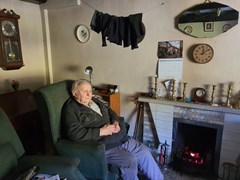
The farms were a world away from the technical hubs they are today. Most of them were cultivated to grow food for quarrymen and their families and farmwork was powered by horses. But things were about to change.
Robert said: “About 1947 a tractor salesman started coming around and sold one to Foel Farm. In the years after that, we all started buying tractors. In those days a Fergie Fach would cost you £325 and a plough would cost £25, so for £350 you had the tools to make ploughing so much easier.''
Horses, however, were not completely redundant. Robert was often asked to help out with other important occasions in the village. “When the hearse needed to be taken to the cemetery I would take the horse to draw it. Once, I was booked for two funerals on the same day, but the first funeral service took a bit longer than expected. I knew I had a second funeral to attend to, so I had to get a move on.
“It was quite amusing to hear from my father after his day’s work at the quarry on the following Monday that many of the mourners were complaining that I was going too fast as they were trying to walk behind the hearse and struggling to keep up. Almost running,” he remembers.
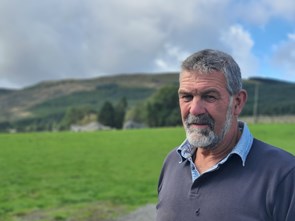
He is in a unique position to notice the changes across the generations. He said: “ I’m the third generation on this farm and the family was in the valley before that. My roots are very deep in the Machno Valley.”
He remembers when the valley was almost wholly Welsh: “The first ever branch of the Urdd was established here, there were two chapels and an annual eisteddfod held in the villages. I remember the first English family coming to live here and within a few weeks the two children were fluent in Welsh. It was either that or nothing because we hardly spoke any English at all.”
The recent drive for sustainability and reducing food miles brings a gentle smile to play on his face.
“Recently I’ve been supplying butchers in Llanrwst directly. Nothing is pushed unduly. The food miles are very low. No more than twelve miles. Quite often you can follow it all the way from here down to the hotels in Betws y Coed. It’s simple but it works. Good Welsh beef.”
Dafydd remembers there was a time when the food chain was even more local: “There’d be a slaughterhouse in the village. There’d be one in Penmachno as well, only three miles away. The butcher used to go around with his van as far as Ysbyty Ifan.
“There was a grocer as well who would go around the farms in a van twice a week. If you wanted more of anything you could leave a note by the gate or tell somebody in chapel on a Sunday!”
As life in the valley evolved and the number of farms began to decrease due to the merging of small holdings, it seemed that the ever expanding forests would spell the future for the communities. What transpired couldn’t have been more different.
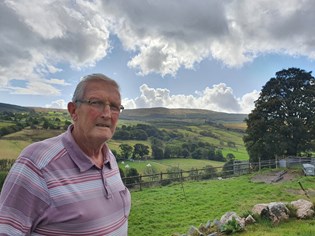
“When the forestry started here they gave us hope, insisting that forestry was more labour intensive than agriculture. Unfortunately, that’s not the case. After you’ve planted the trees, in the UK it takes about forty to fifty years for them to grow large enough to be harvested. So there's no work for that period of time.
“These days if they need any big jobs doing they bring contractors in. I remember 60 people working in the Forestry in Penmachno. There isn’t one here now. There's only two forestry workers doing maintenance and that type of thing in the whole of the Conwy valley.”
So, what of the future? In many ways, Cwm is a microcosm of Welsh hill farming generally, a hybrid task of providing high quality but plentiful and low priced food, and stewardship of the environment.
The sun hasn’t quite set behind the conifers yet, and there are still young farmers keen to take up the challenge of modern-day farming in Cwm Penmachno.
Amongst them is Iwan Jones. But, like so many of his contemporaries, he is taking up the challenge part-time.
Two years ago he and partner Gwawr took on the tenancy of Carrog, an 80 acre smallholding in the upper reaches of Cwm Penmachno. In a move which is becoming quite common in the industry, Iwan combines the main farm with another parcel of land nearer the coast and some common land to keep 300 sheep, but he is hoping to keep a small herd of beef cattle in the coming years.
He also works five days a week to supplement the income from the farm. He says: “I don’t think I could do it without working full time. That’s the main source of income. That’s what I do now, I’m used to it. Get up in the morning, go to work, come home. A few jobs at night. I do most of the jobs on a Sunday.”
Credig Morgan is another of the new generation, working alongside his parents, Heddwyn and Buddug Morgan on their 450 acre farm, Pen y Bont. But Credig has found that the most effective way to address the problems raised by the poor, rocky land is to depend on the tried and tested methods.
The family’s solution is to cultivate the land in the traditional way in which it has been farmed for centuries. Putting the hardy animals first and often braving biting winds and driving rain to make sure they are well looked after.
Heddwyn explains: “It’s quite traditional the way we do it. Low input; that is what makes it sustainable. But it’s very labour intensive, not many people do it.”
Despite the hard, conscientious work being done on farms across Wales and here in the valley, farmers have had enough of being blamed for all the countryside’s ills.
Cyril Lewis feels the future is gloomy in the valley for farming unless major policy changes are made and points out what - to many - is the obvious: “I wouldn’t like to be a young farmer today, looking at the future of farming more as a conservation farmer than farming to produce food.
“One of the big problems is there’s a disconnect between people in the towns and agriculture. When we see food shortages, they don’t link it to how farming has been forced to change. Tourism is the same; people come to Wales because of the beauty of the place. That beauty hasn’t simply emerged in five, ten, fifty years. It’s because of hundreds of years of how it’s been managed.
“My biggest worry is if more trees are planted in the valley we will have yet another knock like we had in 1962. We must avoid that at all costs for the sake of the community. If any tree planting is proposed for the valley in the future the local people must be consulted before doing so.”



